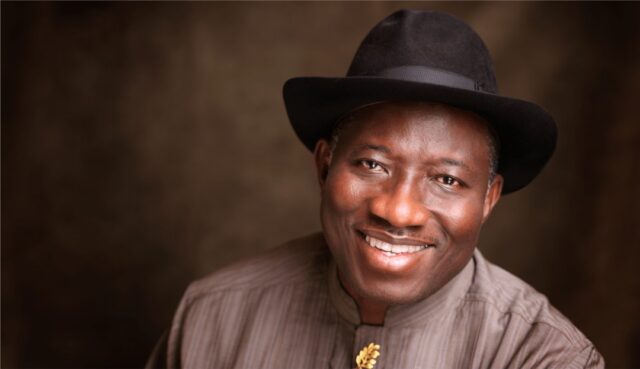By Ima Niboro
There is no question that whispers of a Goodluck Jonathan comeback in 2027 have swirled for months. Of course the rumour mill has been working overtime regarding this subject matter. But the man at its epicentre, former President Goodluck Jonathan, has not declared. He has neither started what we call a “mosquito campaign” in politics, nor even personally hinted at a return.
Yet on Monday, my senior brother and colleague, Mr. Bayo Onanuga, spokesman to President Bola Tinubu, launched a sweeping attack on Jonathan’s presidency, dismissing it as “dismal” and warning Nigerians not to allow him back. The question that arises is simple: why this attack, and why now?
I write as a card-carrying member of the All Progressives Congress (APC). I campaigned for this president. I supported his vision, because I saw in him “the” true successor to Jonathan in terms of economic policy and strategic national vision. Because of this, I will not stand by while the government I proudly served—as Senior Special Assistant to the Vice President, as Special Adviser to the President, and as Managing Director of the News Agency of Nigeria—is openly and needlessly maligned as though it achieved nothing. History, if it is to be honest, cannot be written in such cruel strokes.
Let me also be clear: I hold Mr. Onanuga in the highest personal regard. He is a respected senior colleague and my successor at the News Agency of Nigeria, NAN. Indeed, in Nigeria’s media and political history, only three of us, the late and highly regarded Mrs. Remi Oyo, Onanuga, and myself, have had the distinction of serving as presidential spokespersons and CEOs of NAN; even if Onanuga’s case happened in a little bit of a reverse order.
Till today, he is one of the few Tinubu aides who has kept his doors and ears open to colleagues and friends. But to this statement of his, I say with all due respect: No, Sir.
Goodluck Ebele Jonathan’s presidency was not perfect. No presidency is. None will ever be. But Jonathan’s was far from the caricature of “ruin” and “cluelessness” that Onanuga now paints. By the time President Jonathan left office in 2015, Nigeria’s foreign reserves stood at $42 billion; the Sovereign Wealth Fund held $1 billion; the Excess Crude Account was at $2.2 billion despite relentless pressure from governors who insisted on taking out all the money because they claimed it was unconstitutional. The LNG signature bonus account had $5.8 billion. Are these numbers of economic collapse or the numbers of careful stewardship?
Jonathan’s administration presided over the rebasing of Nigeria’s economy in 2014, making it the largest in Africa, ahead of South Africa. New growth sectors, telecommunications, Nollywood, and services were properly captured, boosting investor confidence. In 2012, Nigeria’s stock market was ranked among the world’s top three performers. Foreign direct investment surged, particularly from China and other strategic partners; and CNN Money had projected Nigeria to be the world’s third fastest growing economy by 2015.
CNN had reported further: “Nigeria is set to be the first African country with an economy larger than $1 trillion, according to the latest projections from the U.S. Department of Agriculture. Africa’s most populous nation, which recently held peaceful elections, revamped its gross domestic product data in 2014 and pulled ahead of South Africa to become the continent’s largest economy with a GDP of $469 billion. Between now and 2030, experts predict annual growth rates as high as 7.92%, resulting in a GDP of $1.05 trillion.
“A lot of Nigeria’s growth will come from agriculture, and services are huge in Nigeria,” says Charles Robertson, global chief economist at Renaissance Capital. He adds that he actually expects the country’s GDP to reach $1 trillion before 2030. “Banking, retail, telecoms, and Nollywood have been an explosive growth story in the past couple of years.
“As a source of employment for 70% of Nigeria’s population in 2013, the country’s $56 billion agriculture sector currently accounts for 24% of GDP, and the country’s minister of agriculture, Akinwumi Adesina, has said “the new millionaires of Nigeria will be in agriculture.”
Indeed, Jonathan’s Agricultural Transformation Agenda, under Adesina, revolutionized food production. The e-wallet system broke decades of corruption in fertilizer distribution, delivering previously scarce fertilizer directly to millions of farmers. Dry-season farming scaled up yields in the North. Under Jonathan, a 50kg bag of Nigerian-grown and polished rice was N8000. Repeat: Eight Thousand Naira. At that same time, Nigeria became the world’s largest cassava producer.
In infrastructure, Jonathan put in motion the revival of rail transport. The Abuja–Kaduna standard gauge railway was completed; narrow-gauge lines were rehabilitated. The second Niger Bridge was commenced. Federal roads were rebuilt across the country. Airports were modernized, including the elevation of Akanu Ibiam Airport in Enugu to international status.
I remember as clearly as yesterday what he and I discussed about the sweeping airport development and renovation programme in one of our strategy sessions. He said that the very first impressions of a country are formed right at the arrival airport, and that if we must change the world’s perception of Nigeria, we might as well start by clearing out our ramshackle airports and build new ones that tell a more compelling story to our international visitors.
In education, Jonathan established 14 new federal universities, nine of them in northern states, and built 166 Almajiri schools. He launched scholarship programmes like PRESSID to send Nigerian graduates to the world’s top universities in science and innovation.
For the younger generation who might need their memories rejigged, here is what Google AI has to say about PRESSID: “The PRESSID scholarship was a Nigerian Presidential Special Scholarship Scheme for Innovation and Development initiated by former President Goodluck Jonathan for first-class Nigerian graduates to pursue postgraduate studies at top global universities. The program was known for its competitiveness and was intended to address educational gaps and foster national development through human capital. However, reports indicate the scheme stopped awarding scholarships under the subsequent Buhari administration, leaving some beneficiaries in a difficult situation.”
Well, what Google failed to add is that Jonathan actually started this program as governor in Bayelsa state, and recreated it at the federal level when he became president.
So my question is: Are these the footprints of failure or evidence of great vision?
Jonathan’s government introduced governance reforms that remain the foundation of today’s fiscal discipline: the Integrated Payroll and Personnel Information System (IPPIS), and the Treasury Single Account (TSA). These systems, derided by some at the time, are now celebrated as central tools in fighting leakages and corruption.
In health, Jonathan’s swift response to the 2014 Ebola outbreak drew global praise. His administration reduced polio cases to a single digit before it disappeared, only to return under Buhari in yet unclear circumstances. Jonathan made powerful gains in maternal and child health, and in security, procured hardware that enabled the military to reclaim territories seized by Boko Haram.
Indeed, when US President Barack Obama, with the urging of the then opposition APC, refused to sell arms to the Jonathan government and blocked global defence transactions with Nigeria, rumours had it that money was put in private planes to get weapons into Nigeria from anyone willing to sell to break the back of Boko Haram and their co-travellers.
I doubt if anyone will contest the fact that it was Jonathan who truly deepened Nigeria’s democracy. Under him, INEC enjoyed greater autonomy; elections in 2011 were widely adjudged credible. Opposition parties won governorships and legislative seats, and their victories were respected. In 2015, Jonathan conceded defeat peacefully, a first in Nigeria’s history and a global democratic milestone. That act alone remains etched in world history.
So why, then, this rush to smear Jonathan? Is it because the mere rumour of his return unsettles those in power today? Is it because he still commands respect across divides? Or because the memory of his governance remains far kinder than the press releases that now seek to undermine him?
Mr. Onanuga, in his statement, praised Tinubu for subsidy removal, but Nigerians remember who stood against Jonathan when he attempted the same reform. It was Tinubu himself, alongside others, who led protests that forced a reversal in 2012. To now blame Jonathan for “allowing the economy to bleed” is disingenuous. He sought to cauterize the wound; they stopped him, and now they accuse him of not stopping the hemorrhage? Gosh!
To my mind, what is past is past, and Tinubu’s record in GDP growth, inflation control, and rising reserves should be allowed to stand on its own merits. It should not require rewriting Jonathan’s presidency into a tale of ruin. Politics must be rooted in a measure of honesty. Is it not said that there must be honour even among thieves, not to speak of great patriots like our good selves!!!
Whether Jonathan runs in 2027 or not, his record remains what it is: the economy’s expansion, agricultural reform, revived rail, modernized airports, new universities, governance innovation, health gains, and deepened democracy. These cannot be erased by the flourish of anyone’s pen. Nigerians lived them. Nigerians remember.
So, I say again: I respect Mr. Bayo Onanuga as a senior colleague and compatriot. But to this statement of his… this premature assault on a man who has not declared for 2027… I respond firmly, respectfully, and unequivocally: No, Sir.
Niboro, former spokesman to President Goodluck Jonathan, is the publisher of KTH Daily.






















